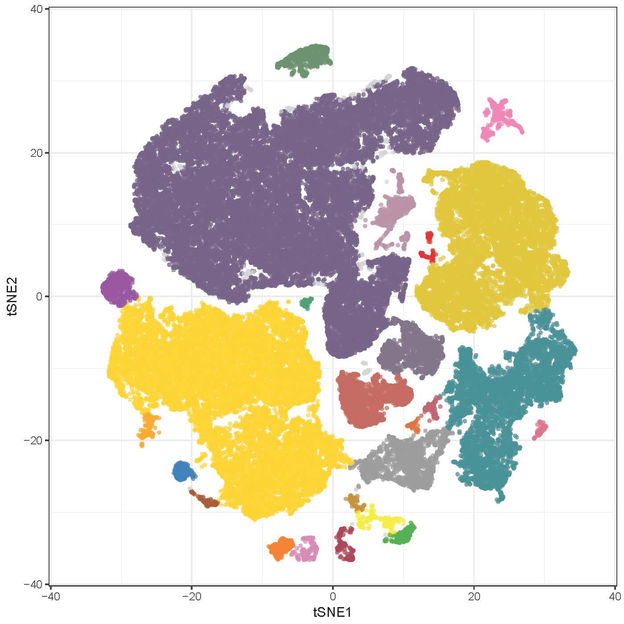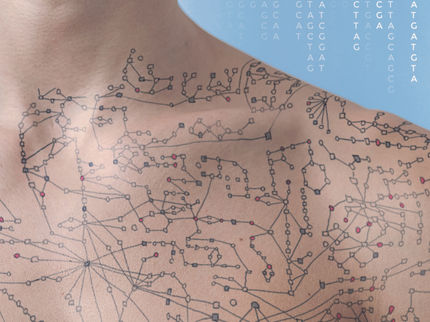Human MAIT cells sense the metabolic state of enteric bacteria
A little-explored group of immune cells plays an important role in the regulation of intestinal bacteria. Changing metabolic states of the microbes have an effect on defense cells at different stages of alert or rest, as researchers from the Department of Biomedicine at the University and University Hospital of Basel report in the journal "Mucosal Immunology."

Clusters of MAIT cells in human blood and colon biopsies. Subpopulations of these defense cells group into colored "continents" according to the markers expressed by the cells.
Department of Biomedicine, Tobias Rutishauser
It is known that the metabolites of bacteria influence the composition and function of immune cells resident within the gut. These defense cells include MAIT cells (mucosal-associated invariant T cells), which were only recently discovered and are naturally abundant in the gastrointestinal mucosa, skin liver, and blood. These cells are specialized in recognizing the microorganisms living in every human being and monitoring their activities.
Different populations in gut vs. blood
A group led by Prof. Dr. Gennaro De Libero from the University of Basel and PD Dr. Petr Hruz from the University Hospital of Basel have investigated how MAIT cell activation and function is influenced by bacterial metabolites produced in normal colon. The study revealed that distinct populations of MAIT cells are located in the human intestinal mucosa. These populations were identified in gut biopsies using highly innovative methods and bioinformatics analyses.
Result: MAIT cells are present in variable states of alert and rest, in accordance with the metabolic state of intestinal bacterial flora. The defense cells are most frequently stimulated by bacteria grown under low-oxygen and slow growth-phase - conditions such as those found in the large intestine. MAIT cells can then directly influence local inflammation but also tissue healing and cell fitness in the gut by producing different messenger substances.
“Fine balance”
"Our results show that there is a fine balance occurring in the gut between microbial growth conditions, the production of stimulating metabolites and the response of MAIT defense cells," state the researchers. The metabolism of microbes in the intestine constantly adapts to changing host conditions. By detecting the metabolic state of enteric bacteria, MAIT cells can potentiate their function in mucosal immunosurveillance.
Original publication
Mathias Schmaler et al.; "Modulation of bacterial metabolism by the microenvironment controls MAIT cell stimulation"; Mucosal Immunology; 2018
Original publication
Mathias Schmaler et al.; "Modulation of bacterial metabolism by the microenvironment controls MAIT cell stimulation"; Mucosal Immunology; 2018
Topics
Organizations
Other news from the department science

Get the life science industry in your inbox
By submitting this form you agree that LUMITOS AG will send you the newsletter(s) selected above by email. Your data will not be passed on to third parties. Your data will be stored and processed in accordance with our data protection regulations. LUMITOS may contact you by email for the purpose of advertising or market and opinion surveys. You can revoke your consent at any time without giving reasons to LUMITOS AG, Ernst-Augustin-Str. 2, 12489 Berlin, Germany or by e-mail at revoke@lumitos.com with effect for the future. In addition, each email contains a link to unsubscribe from the corresponding newsletter.



















































